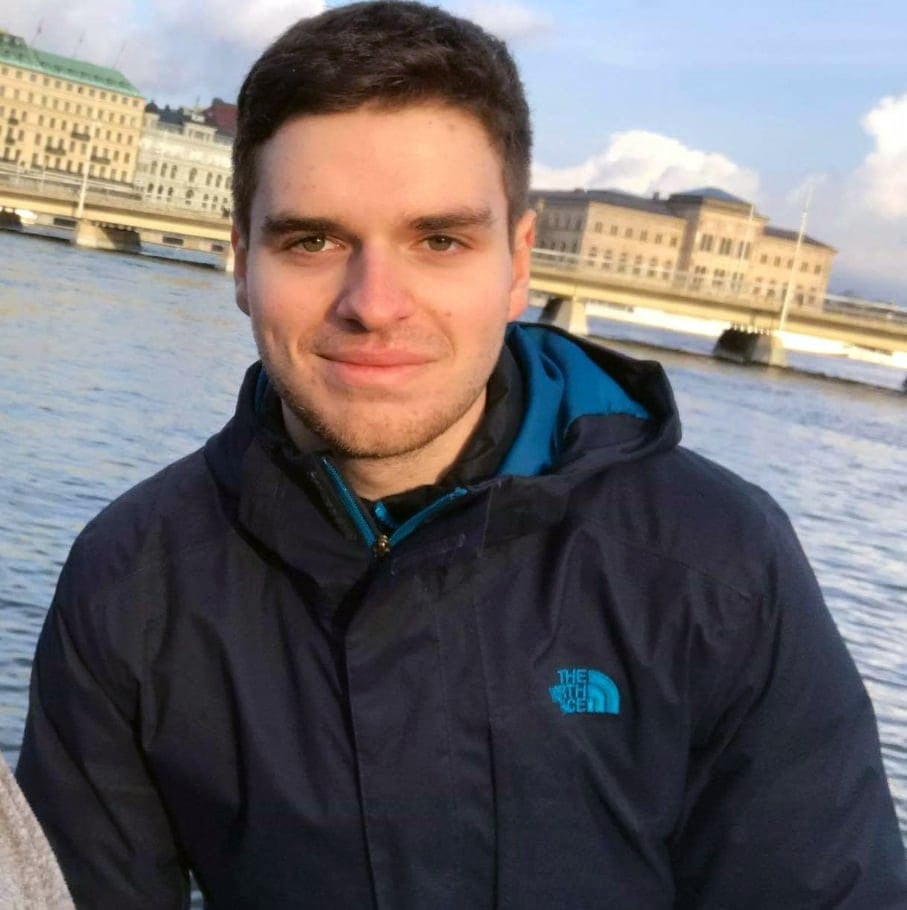KINGSTON, R.I. – May 5, 2021 – In his four years at the University of Rhode Island, Jay Rumas has shown an enthusiasm for politics and public service.
The North Smithfield resident has served on the Student Senate, as president of URI’s American Civil Liberties Union chapter, and as vice president of the College Democrats. He’s spoken before the Faculty Senate during the successful campaign to cancel classes on Election Day, and before the Narragansett Town Council against an ordinance to limit the number of students in rental units. He’s also worked on and volunteered for political campaigns for candidates in Woonsocket and statewide.
Now, Rumas, who graduates in May with a double major in political science and history, is exploring his academic interests in politics as part of a prestigious Fulbright scholarship. In September, Rumas will travel to the Slovak Republic for a nine-month research project investigating the appeal of populism among the country’s Rusyn population.
“I think it will be very interesting to see how the rhetoric of populist politicians impacts a minority group like the Rusyns, who have really fought to preserve their identity over the past 100 years,” Rumas said. “I want to see whether they have any different opinions on this matter than Slovaks, who are the dominant ethnic group. I think it’s not only relevant to the area, but also to the world and to America as well.”
In Slovakia, Rusyns make up less than 1% of the country’s 5.4 million people. Unlike other Slavic groups, they have always been subject to the power of other groups. Rumas wants to see how that has affected their support of populist leaders, who champion a political narrative of the majority – the people – versus the elite.
Rumas visited Slovakia in early 2020 as part of a study-abroad semester in Prague, Czech Republic. While there, he witnessed an election weekend. The country’s voters frequently change parties, he said, and during that election, a political coalition with a membership of fewer than a thousand managed to overturn the party that had held power for a decade.
“Populism is very prevalent there,” he said. “Oftentimes, you have a history of demagogues, people ‘telling it like it is.’ Much of this came out of the post-communist era. When the Berlin Wall fell and communism in these countries was essentially dismantled, the coalitions that had dismantled communism began to fragment. There was a very strong right-wing populist group that was part of one of those coalitions, and that faction holds power in Hungary now.”
Rumas’ interest in the topic and region grows out of his family history and the courses he’s taken at URI. His maternal grandmother’s family fled Czechoslovakia in the late 1930s during the Nazi occupation. At URI, Rumas has researched the region and post-communist politics with James Mace Ward, a senior lecturer in modern European history.
“I think it’s very important to look at other countries for our sake as well as the world’s,” Rumas said. “Political developments here also made me very interested in the rise of populism, seeing what has happened in our country and how I think democracy here and around the world has been threatened. That made the project much more important in my eyes.”
Along with building his passion for the region and the topic, Rumas credits Ward with helping shape the idea for the project. Also, he said classes with Shanna Pearson-Merkowitz, a professor of political science, helped him develop the methodology he will use, along with skills in conducting polls and interviewing.
“I’ve had the pleasure of teaching Jay in everything from freshman surveys to graduate courses, and he’s always been a stellar student,” said Ward. “He has the good fortune to be blessed with not only a fine mind and an infallible work ethic, but also an urgent need to make the world better. His project offers welcome scholarship on an understudied people, the Rusyns, and should help us understand how to manage the challenges of populism.”
Rumas’ project does face a couple of hurdles. To research his project, he plans to interview members of the Rusyn minority group. He speaks “very little” Czech, which is similar to Slovak, Slovakia’s dominant language. But he plans to learn Slovak this summer.
The other hurdle, of course, is the pandemic. The Slovak Republic, which has had almost 400,000 COVID-19 cases, is among the countries with the highest travel warnings listed by the Centers for Disease Control and Prevention. “It’s not as highly vaccinated as the U.S., but hopefully that’s going to pick up,” he said.
Under the Fulbright U.S. Student Program, Rumas will be hosted by the Institute of Rusyn Language and Culture, part of the University of Prešov, and will likely live in the city of Prešov, in the eastern part of the country. When the project is complete, Rumas plans on publishing a paper or turning his research into a dissertation for graduate school.
The Fulbright U.S. Student Program is designed to increase mutual understanding between the people of the United States and those of other countries by providing high-achieving students with the opportunity to research, study or teach abroad. The Fulbright Study/Research Awards program enables applicants to design their own research projects to work with institutions abroad.
URI students and recent graduates who are interested in applying to the Fulbright program should contact the URI Office of National Fellowships and Academic Opportunities for guidance and institutional endorsement.

